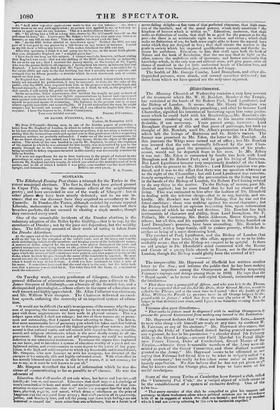On Tuesday week, seventy gentlemen of Glasgow, friends to the
general diffusion of education among the people, gave a dinner to Mr. James Simpson of Edinburgh,—an advocate of the Scottish bar, mind a distinguished phrenologist,—whose efforts in the cause of education are well known and highly appreciated. Mr. Allan Fullerton was chairman, and Mr. William Weir croupier. The Chairman delivered an excel- lent speech, enforcing the necessity of an improved system of educa- tion.
"It would not be difficult (he said) to assign some of the reasons why the pro- cess of improving the hutnan mind among us has in no reaeenahle degree kept pace with those improvements we have made in physical science. This is a subject upon which I shall not enlarge; but two of these reasons are so proud. nent and outstanding, that I cannot forbear adverting to them. The first is, that must unreasonable love of pecuniary gain which has taken such fast hold on Us as to threaten the extioction of the highest plinciples of our nature ; and the second is that national vanity and self-conceit with regard to literary, scientific, moral, and religious attainments, which is the most deadly enemy to all im- provement. Blinded by avarice and self complacency, we could see nothing defective in our educational institutions. To remove the stigma thus implanted on our brow, and to introduce a system of education worthy of a grett and en- lightened nation, and commensurate in some degree to the wants of her popu- lation, is the high and noble emprise to which my hueourable and learned friend, Mr. Simpson, who now houours us with his company, has directed all the energies of his naturally able and highly-cultivated mind. With what effect he has already laboured and written in this hest of causes, it is not nece,l-a; y for me to say, as it must be well known to you all."
Mr. Simpson described the kind of information which he was de- sirous of communicating as far as possible to al! classes. Ile was the advocate of Education, that sl,ahl render all not only wiser, but becer and hap.aer,—all intellitnt. bon .st, and nieici;o1. Education. that shall impart a I: aowledge of mau's coustitutiatt in body and ariud. anti the important relations of that con- stitution to cx,e.ual cremion. that s;•a" render t!ie youngest familiar with the laws, phy.ieal, tetaeic, and moral, which dema•M obedience as the price of ?spiritless wad the sa:e:oaid nom misery ; that shall exercise all in Leaerosity, Justice, and broilie.lv love, and tell the young Unit these high feelinbs are not
bestowed con,rol die' mere auitueliern auri selfishness, but as a fount: iu of
never-failing delight—a fine taste of that perfected character, that high exer- cise of the intellect, and of the moral powers, which truly constitute" the kingdom of heaven which is within us." Education, moreover, that shall make no distinction of ranks, that shall be as good for the peasant as for the peer—for there is no aristocratic right to wisdom and virtue ; which shall make no distinction of sex, for both sexes ought alike to know the natural laws under which they are designed to live; that shall elevate the teacher to the grade in society which his improved qualifications warrant, and thereby in- crease his usefulness. Falnaat.on, in tine, that shall open both the book of Nature and the Look of Revelation, that the one may shed its light on the other, remove the multiform evils of ignorance, and bestow universally that knowledge which, in the only true and rational sense, will give peace, unite all classes of mankind in the yet little understood bonds of Christian love, anti render all men wise, benevolent, just, contented, and happy.
The health of Mr. George Combe, Lord Brougham, and other dis- tinguished persons, were drunk, and several speeches deliveted ; bat those from which we have quoted are the only ones reported.


























 Previous page
Previous page